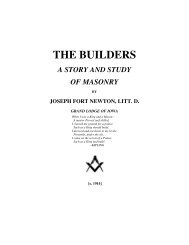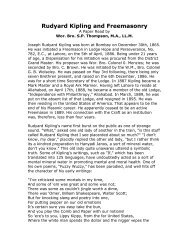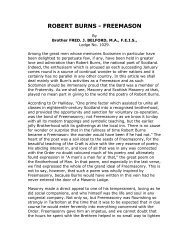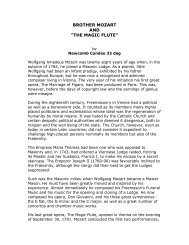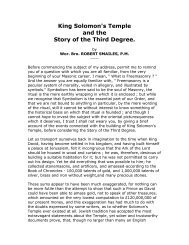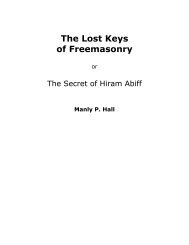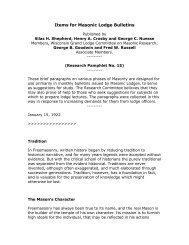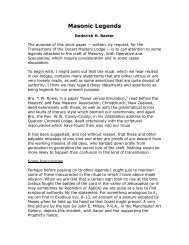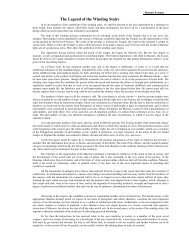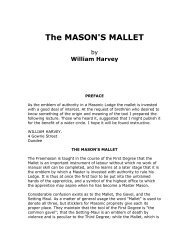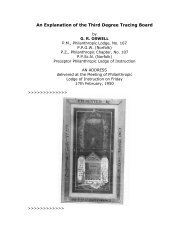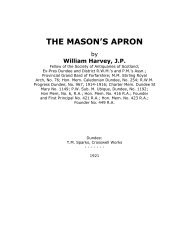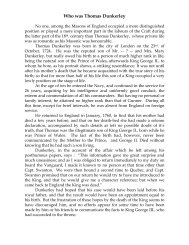Through the Key Hole - RoseCroix.org.au
Through the Key Hole - RoseCroix.org.au
Through the Key Hole - RoseCroix.org.au
You also want an ePaper? Increase the reach of your titles
YUMPU automatically turns print PDFs into web optimized ePapers that Google loves.
127<br />
But what elements for scandal! William M<strong>org</strong>an was about to publish<br />
a Masonic exposé. Masons had been convicted of abducting<br />
him. A body had been found identified as M<strong>org</strong>an. John Whitney on<br />
his death bed related what actually happened in that M<strong>org</strong>an had<br />
accepted a sizeable sum of money as a bribe to disappear and <strong>the</strong><br />
Masons involved in his “abduction” had only facilitated his removal to<br />
Canada.<br />
Ano<strong>the</strong>r involved party by <strong>the</strong> name of Thurlow Weed also stated that<br />
he had received a death bed confession from John Whitney and that<br />
this confession related how M<strong>org</strong>an had been murdered, bound in<br />
chains and taken in a boat to <strong>the</strong> centre of <strong>the</strong> river where he was<br />
dumped over board..<br />
It is difficult I believe for us now to envisage <strong>the</strong> extent of <strong>the</strong> negative<br />
impact that this story created.. The fame or infamy of <strong>the</strong> affair<br />
spread all over <strong>the</strong> country and an anti-Masonic sentiment spread<br />
like wild fire. Meetings were held, <strong>the</strong> Order was denounced by both<br />
press and pulpit, an anti-Masonic newspaper was started and in general,<br />
feelings were whipped to a very high pitch. Freemasons became<br />
synonymous with murderers and kidnappers.<br />
Gould in his “History of Freemasonry” epitomises <strong>the</strong> spirit of <strong>the</strong><br />
time : “This country has seen fierce and bitter political contests, but<br />
no o<strong>the</strong>r has approached <strong>the</strong> bitterness of this campaign against <strong>the</strong><br />
Masons. No Society, civil, military or religious, escaped its influence.<br />
No relation of family or friends was a barrier to it. The hatred of Masonry<br />
was carried everywhere, and <strong>the</strong>re was no retreat so sacred<br />
that it did not enter. Not only were teachers and pastors driven from<br />
<strong>the</strong>ir stations, but <strong>the</strong> children of Masons were excluded from <strong>the</strong><br />
schools and members from <strong>the</strong>ir churches. The sacrament was refused<br />
to Masons by formal vote of <strong>the</strong> church, for no o<strong>the</strong>r offence<br />
than <strong>the</strong>ir Masonic connection.<br />
Families were divided. Bro<strong>the</strong>r was arrayed against bro<strong>the</strong>r, fa<strong>the</strong>r<br />
against son and even wives against <strong>the</strong>ir husbands. Desperate efforts<br />
were made to take away chartered rights from Masonic Corporations<br />
and to pass laws that would prevent Masons from holding<br />
<strong>the</strong>ir meetings and performing <strong>the</strong>ir ceremonies.”<br />
49<br />
NON OPERATIVE OR ACCEPTED AND<br />
SPECULATIVE MASON<br />
By ANON , edited by Keith Stockley<br />
The operative period of <strong>the</strong> Masonic fraternity flourished from <strong>the</strong><br />
11th to <strong>the</strong> 15th century. The 16th century saw <strong>the</strong> rise of <strong>the</strong> Reformation<br />
in Europe and <strong>the</strong> Gothic style of architecture became<br />
less prevalent. Social conditions and laws altered considerably.<br />
These factors, coupled with <strong>the</strong> Great Plague and <strong>the</strong> Great Fire of<br />
London, as well as <strong>the</strong> introduction of bricks instead of stone,<br />
brought about a decline in operative masonry.<br />
This decline was so great that by <strong>the</strong> late 17th century, freemasons<br />
became so few that only a small; number of lodges remained.<br />
During this period, referred to by Masonic historians as <strong>the</strong> Transition<br />
Period, a number of important citizens commenced taking an<br />
active interest in <strong>the</strong> ancient customs of <strong>the</strong> craft and although <strong>the</strong>y<br />
were not operative masons, <strong>the</strong>y were admitted into lodges. Bec<strong>au</strong>se<br />
of <strong>the</strong> circumstances of <strong>the</strong>ir joining <strong>the</strong> craft, <strong>the</strong>y were<br />
called “accepted” masons.<br />
At first <strong>the</strong> number of “accepted” masons was small, but by <strong>the</strong><br />
early part of <strong>the</strong> 18th century <strong>the</strong>y outnumbered <strong>the</strong> operatives and<br />
exerted a great deal of influence on <strong>the</strong> expansion of Freemasonry<br />
and on its principles of fellowship and charitable pursuits.<br />
On St. John <strong>the</strong> Baptist’s Day, 24th June 1717, four old lodges in<br />
London and Westminster met and <strong>org</strong>anized governing body that<br />
<strong>the</strong>y called <strong>the</strong> Grand Lodge. This Grand Lodge gradually took<br />
control of all lodges meeting in England.<br />
The word “speculative” now became linked with <strong>the</strong> word<br />
“accepted”, speculative meaning masonry in a symbolic sense. The<br />
two original grades of masonry were <strong>org</strong>anized into <strong>the</strong> three degrees<br />
with which we are all familiar.<br />
In 1723, <strong>the</strong> Grand Lodge approved a Constitution and was soon<br />
chartering lodges in England and its colonies.



